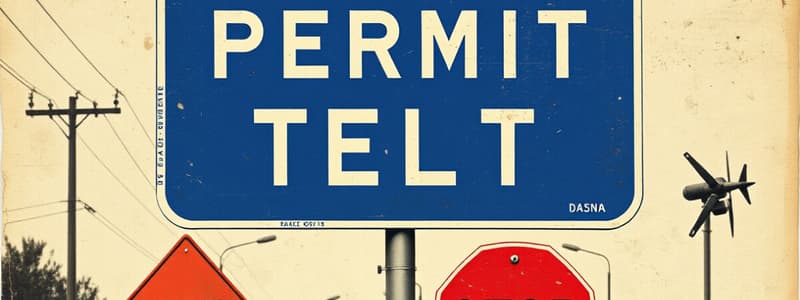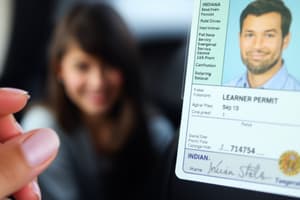Podcast
Questions and Answers
What is the maximum speed limit in a highway work zone?
What is the maximum speed limit in a highway work zone?
45 mph in any location
If you are driving near a school, you must slow down to _________ for the school zone.
If you are driving near a school, you must slow down to _________ for the school zone.
the lowest posted speed limit
A yield sign indicates that a driver must slow down when approaching an intersection and _________ if a vehicle or pedestrian with the right-of-way is approaching from another direction.
A yield sign indicates that a driver must slow down when approaching an intersection and _________ if a vehicle or pedestrian with the right-of-way is approaching from another direction.
be prepared to come to a complete stop
When making a U-turn, what must you NOT do?
When making a U-turn, what must you NOT do?
You must avoid _________ while crossing railroad tracks.
You must avoid _________ while crossing railroad tracks.
When operating a vehicle with a steering wheel interlock system, never turn _________ while the vehicle is in motion.
When operating a vehicle with a steering wheel interlock system, never turn _________ while the vehicle is in motion.
If you are approaching a stop sign, what must you do?
If you are approaching a stop sign, what must you do?
What does Indiana law require regarding seat belts?
What does Indiana law require regarding seat belts?
Which statement is true when driving on highways?
Which statement is true when driving on highways?
What must you do when you see a stationary emergency vehicle with flashing lights?
What must you do when you see a stationary emergency vehicle with flashing lights?
Flashing arrow boards are often used to indicate:
Flashing arrow boards are often used to indicate:
It is dangerous and illegal to try to pass other vehicles when _________ of an intersection, railroad crossing, bridge, viaduct or tunnel.
It is dangerous and illegal to try to pass other vehicles when _________ of an intersection, railroad crossing, bridge, viaduct or tunnel.
If your vehicle's conventional disc or drum brakes suddenly fail, you should immediately:
If your vehicle's conventional disc or drum brakes suddenly fail, you should immediately:
What should you do if fog closes in completely while driving?
What should you do if fog closes in completely while driving?
A red flashing light at an intersection is equivalent to:
A red flashing light at an intersection is equivalent to:
If a tornado is nearby, you must:
If a tornado is nearby, you must:
The likelihood of an accident increases if a driver is under the influence of:
The likelihood of an accident increases if a driver is under the influence of:
When you enter a roundabout or a circular intersection, you must proceed:
When you enter a roundabout or a circular intersection, you must proceed:
With any turning vehicle, the rear wheels follow a _________ than the front wheels.
With any turning vehicle, the rear wheels follow a _________ than the front wheels.
Defensive drivers stay _________ behind the vehicle ahead while driving.
Defensive drivers stay _________ behind the vehicle ahead while driving.
To avoid the effects of glare of the oncoming headlights, the driver should not look directly into the lights of an approaching vehicle, but instead:
To avoid the effects of glare of the oncoming headlights, the driver should not look directly into the lights of an approaching vehicle, but instead:
If you are involved in an accident, you must:
If you are involved in an accident, you must:
What is the first rule of a safe and legal turn?
What is the first rule of a safe and legal turn?
When visibility is diminished, drivers must use low-beams when:
When visibility is diminished, drivers must use low-beams when:
If the speed limit is 50 mph or greater, you must give proper turn signal ________ before turning or changing lanes.
If the speed limit is 50 mph or greater, you must give proper turn signal ________ before turning or changing lanes.
If you are approaching an intersection with a non-operating signal, you should:
If you are approaching an intersection with a non-operating signal, you should:
In a situation with a flat tire or blow-out, you should first:
In a situation with a flat tire or blow-out, you should first:
When you enter an interstate on-ramp, you must stay to the right and _________ to allow your car to merge with traffic.
When you enter an interstate on-ramp, you must stay to the right and _________ to allow your car to merge with traffic.
When turning left from a two-way street onto a one-way street, you must:
When turning left from a two-way street onto a one-way street, you must:
When following a large vehicle at night, always:
When following a large vehicle at night, always:
Flashcards are hidden until you start studying
Study Notes
Speed Limits
- Maximum speed limit in highway work zones: 45 mph, regardless of location.
- In school zones, drivers must abide by the lowest posted speed limit.
Intersection and Yielding Rules
- A yield sign requires drivers to slow down and prepare to stop if necessary for vehicles or pedestrians with the right-of-way.
- Stop at the solid white line when approaching a stop sign.
Driving Restrictions
- U-turns should not be made on curves or near hills.
- Avoid stopping or shifting gears while crossing railroad tracks.
- Do not turn the ignition to lock position while driving in a vehicle with a steering wheel interlock system.
Passenger Safety
- Indiana law mandates seat belt use for drivers and all passengers while the vehicle is in operation.
Highway Driving
- Slow-moving vehicles should utilize the right lane, while faster vehicles should use the left lane.
- When approaching a stationary emergency vehicle with flashing lights, slow down and change lanes if possible.
Road Signs and Signals
- Flashing arrow boards indicate a detour ahead.
- A red flashing light at an intersection is equivalent to a stop sign.
Safety in Adverse Conditions
- It is illegal to pass vehicles within 100 feet of intersections, railroad crossings, bridges, viaducts, or tunnels.
- If a vehicle's brakes fail, shift to a low gear and pump the brake pedal rapidly.
- In dense fog, pull off the road carefully and stop to avoid visibility issues.
Tornado Safety
- If a tornado is near, exit the vehicle and seek shelter in a low-lying area.
Driving Under Influence
- The risk of accidents increases with the influence of alcohol, drugs, or prescription medications.
Roundabouts and Turns
- Vehicles must proceed counter-clockwise in roundabouts.
- When turning, the rear wheels follow a shorter path than the front wheels.
Defensive Driving
- Maintain a following distance of at least two to three seconds behind the vehicle ahead.
Glare Reduction
- To mitigate headlight glare, focus on the right side of the road instead of looking directly into oncoming headlights.
Accident Protocol
- After an accident, stop and share information with other involved parties.
Safe Turning Practices
- The first rule for safe turns is to get into the proper lane well in advance.
Visibility Guidelines
- Use low beams within 500 feet of oncoming vehicles.
- Signal turns or lane changes at least 300 feet in advance when the speed limit is 50 mph or greater.
Intersection Protocol
- At non-operating traffic signals, stop before entering the intersection.
Handling Tire Issues
- In the event of a flat tire or blowout, grip the steering wheel firmly to maintain control.
Merging on Highways
- When entering an interstate on-ramp, stay right and accelerate in the acceleration lane to merge safely with traffic.
Left Turns
- When turning left from a two-way street onto a one-way street, begin the turn with the left wheel close to the yellow dividing line.
Night Driving
- Always dim headlights when following large vehicles at night.
Studying That Suits You
Use AI to generate personalized quizzes and flashcards to suit your learning preferences.




